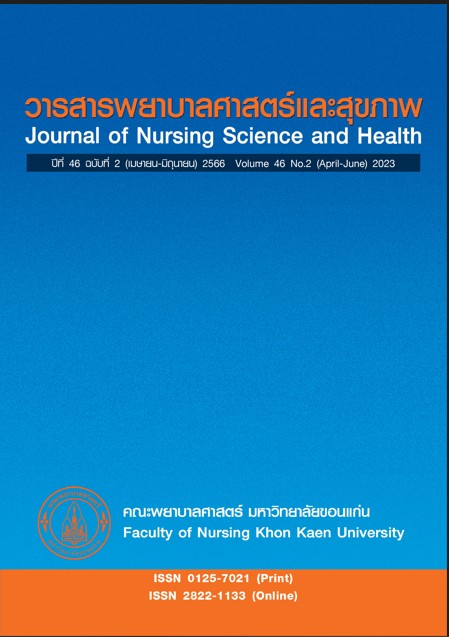ผลการจัดการเรียนรู้แบบออนไลน์เสมือนจริงต่อสมรรถนะการปฏิบัติการพยาบาลครอบครัวในชุมชนของนักศึกษาหลักสูตรพยาบาลศาสตรบัณฑิต มหาวิทยาลัยขอนแก่น
คำสำคัญ:
การจัดการศึกษาเสมือนจริง, นักศึกษาพยาบาล , สมรรถนะการพยาบาลครอบครัวบทคัดย่อ
สถานการณ์การเปลี่ยนแปลงในศตวรรษที่ 21 โดยเฉพาะการระบาดของโรคโควิด 19 ส่งผลกระทบต่อการจัดการเรียนรู้ในสถาบันการศึกษาระดับอุดมศึกษา การใช้ช่องทางออนไลน์ในการจัดการเรียนรู้กลายเป็นส่วนหนึ่งของชีวิตวิถีใหม่ การศึกษานี้มีวัตถุประสงค์เพื่อศึกษาผลของการจัดการเรียนรู้การปฏิบัติการพยาบาลครอบครัวในชุมชนแบบออนไลน์เสมือนจริงต่อการรับรู้สมรรถนะการปฏิบัติการพยาบาลครอบครัวในชุมชนของนักศึกษาหลักสูตรพยาบาลศาสตรบัณฑิต คณะพยาบาลศาสตร์ มหาวิทยาลัยขอนแก่น เก็บข้อมูลนักศึกษาชั้นปีที่ 2 จำนวน 104 คน เครื่องมือประกอบด้วย คู่มือการจัดการเรียนรู้ปฎิบัติการพยาบาลครอบครัวและแบบสอบถามสมรรถนะการพยาบาลครอบครัวในชุมชน วิเคราะห์ข้อมูลด้วยสถิติเชิงพรรณนา Wilcoxon signed rank test และ Kruskal-Wallis H test
ผลการศึกษา พบว่า นักศึกษามีคะแนนเฉลี่ยการรับรู้สมรรถนะการพยาบาลครอบครัวในชุมชนของนักศึกษาหลังการฝึกปฏิบัติ (M=4.33, SD±.47) แตกต่างก่อนฝึกปฏิบัติ (M=3.54, SD±.58) อย่างมีนัยสำคัญทางสถิติ (p-value < .001) ดังนั้นการจัดการเรียนรู้ปฏิบัติการพยาบาลครอบครัวในชุมชนแบบออนไลน์เสมือนจริงโดยการมีส่วนร่วมของพยาบาลวิชาชีพ เจ้าหน้าที่ในหน่วยบริการสุขภาพระดับปฐมภูมิ และอาสาสมัครสาธารณสุขประจำหมู่บ้าน ส่งผลให้เกิดความแตกต่างสมรรถนะการปฏิบัติการพยาบาลครอบครัวในชุมชนตามการรับรู้ของนักศึกษาได้ ซึ่งมีประโยชน์ในกรณีที่นักศึกษาไม่สามารถลงปฏิบัติการจริงในพื้นที่ และสามารถประยุกต์ใช้ในกรณีที่มีการระบาดของโรคติดต่ออุบัติใหม่ อุบัติซ้ำ
เอกสารอ้างอิง
World Health Organization. World health statistics 2022: Monitoring health for the SDGs, sustainable development goals. Geneva: World Health Organization; 2022. [cited 2022 Nov 20]. Available from: https://kku.world/u4apr
Inthason S. COVID -19 and online teaching case study: Web Programming Course. Journal of Management Science Review 2020;22(2):203–13. (in Thai)
Mathuros S. Management education online in the new normal COVID-19. Rajapark Journal 2021;15(40):33–42. (in Thai)
Benderev MD. States modify home visiting services in response to COVID-19. ZERO TO THREE. [cited 2022 Nov 20]. Available from: https://kku.world/9ja1y
Williams K, Ruiz F, Hernandez F, Hancock M. Home visiting: A lifeline for families during the COVID-19 pandemic. ArchPsychiatrNurs 2021;35(1):129–33.
Mogil C, Hajal N, Garcia E, Kiff C, Paley B, Milburn N, et al. Focus for early childhood: A virtual home visiting program for military families with young children. ContempFamTher 2015;37(3):199–208.
Graham CR. Emerging practice and research in blended learning. In Moore MG (Ed.), Handbook of distance education, 3rd ed. New York: Routledge; 2013:p. 333–50.
Dziuban C, Graham CR, Moskal PD, Norberg A, Sicilia N. Blended learning: The new normal and emerging technologies. Int J Educ Technol High Educ 2018;15(3):1-16.
Han F, Ellis RA. Explaining medical students’ learning outcomes in blended course designs: Combining self-reported and observational learning experiences. Advances in Physiology Education 2022;46(1):56-64.
Tsegay SM, Ashraf MA, Perveen S, Zegergish MZ. Online teaching during COVID-19 pandemic: Teachers’ experiences from a Chinese University. Sustainability 2022;14(1):568.
Jerayingmongkol P, Anansirikasem P, Chalardlon P, Damsangsawat N. Family and Community Nursing II Practicum course provision under the COVID-19 Situation: The Effects of Blended Learning on learning outcomes. Journal of Nursing and Education 2022;15(3):71–81. (in Thai)
Nimwatnakul S, Pradubtong O, Kanungpiarn T, Sanpaung S. The Development of Blended Learning Model in Adult Nursing 1 for student nurse. Journal of Nursing and Education 2022;15(2):73–86. (in Thai)
Palacheewa N, Tongtham A, Lhimsoonthon B, Thangkratok P. Integrated learning management based on face-to-face learning and online instruction in Primary Medical Care Course for nursing students in the new normal era. Ramathibodi Medical Journal 2021;44(2):39–49. (in Thai)
Koehler M, Mishra P, Akcaoglu M, Rosenberg J. The Technological Pedagogical Content Knowledge Framework for teachers and teacher Educators; 2013 [cited 2022 Nov 20]. Available: from: https://kku.world/m65r1
Saelow W, Yuangsoi P, Roungrong P. The development of TPACK Model online instruction to promote team work for undergraduate students. STOUEducationalJournal 2022;15(2):102–16. (in Thai)
Johnson RB, Christensen L. Educational research: quantitative, qualitative, and mixed approaches, 7th ed. California : SAGE Publications; 2020.
Rybińska A, Best DL, Goodman WB, Weindling W, Dodge KA. Home visiting services during the COVID-19 pandemic: Program activity analysis for family connects. MaternChildHealthJ 2022;26(1):70–8.
Moolsart S. The clinical telesupervision in Family Nursing Practicum. JRoyalThai ArmyNurses 2020;21(2):35–43. (in Thai)
Yoshioka-Maeda K, Honda C, Sumikawa Y, Okamoto Y, Shimada M, Fujii H, et al. Developing a Virtual Reality Simulation Program for Improving Nursing Students’ Clinical Reasoning Skills in Home Settings: A protocol aper. NursRep 2022;12(4):968–79.
Sutherland JL, Palmer D, Reuther P, Leiby P. Integrating home care: an innovative approach for simulation learning. JNursEduc 2021;60(3):172-176.
Mohamed FA. The effectiveness of the Blended Learning in Enhancing EFL learning and collaboration. World Journal of English Language 2022;12(1):92–103.
Tathahira T. Promoting students’ critical thinking through online learning in higher education: challenges and strategies. Englisia: Journal of Language, Education, and Humanities 2020;8(1):79–92.
Carmichael E, Farrell H. Evaluation of the effectiveness of online resources in developing student critical thinking: review of literature and case study of a critical thinking online site. Journal of University Teaching & Learning Practice 2012;9(1):1-17
Yoshida Y, Uno T, Tanaka H, Hakosaki I, Shigeta K, Yano R. Cognitive changes with psychomotor skill acquisition through blended learning among nursing students: A qualitative study. Nurse Education in Practice 2022;65:103486.
Siah CJR, Huang CM, Poon YSR, Koh SLS. Nursing students’ perceptions of online learning and its impact on knowledge level. Nurse Education Today 2022;112:1-77.
Jantacumma N. The Community Health Nursing Practicum Models in Distance Learning System, School of Nursing at Sukhothai Thammathirat Open University. JHNR 2021 Apr 9;37(1):51–64. (in Thai)
ดาวน์โหลด
เผยแพร่แล้ว
รูปแบบการอ้างอิง
ฉบับ
ประเภทบทความ
สัญญาอนุญาต
ลิขสิทธิ์ (c) 2023 วารสารพยาบาลศาสตร์และสุขภาพ

อนุญาตภายใต้เงื่อนไข Creative Commons Attribution-NonCommercial-NoDerivatives 4.0 International License.
วารสารพยาบาลศาสตร์และสุขภาพเป็นเจ้าของลิขสิทธิ์ในการเผยแพร่ผลงานที่ตีพิมพ์ห้ามผู้ใดนำบทความที่ได้รับการตีพิมพ์ในวารสารพยาบาลศาสตร์และสุขภาพไปเผยแพร่ในลักษณะต่าง ๆ ดังนี้ การนำบทความไปเผยแพร่ออนไลน์ การถ่ายเอกสารบทความเพื่อกิจกรรมที่ไม่ใช่การเรียนการสอน การส่งบทความไปตีพิมพ์เผยแพร่ที่อื่น ยกเว้นเสียแต่ได้รับอนุญาตจากวารสารพยาบาลศาสตร์และสุขภาพ



